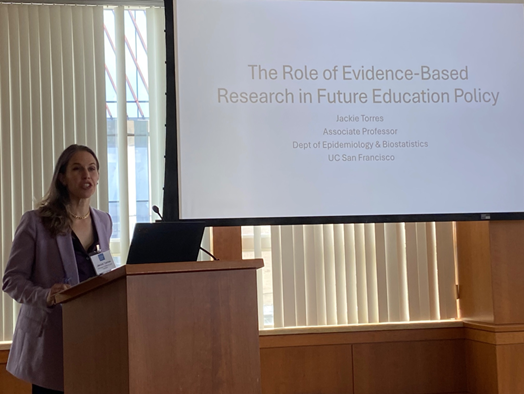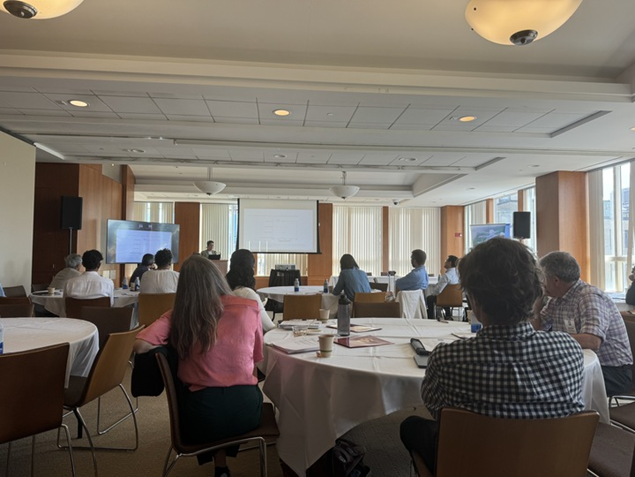The Gateway Education, Aging, and Global Health Conference 2025
Written by: Ava Bindas
Published on: Sep 17, 2025
The Gateway to Global Aging and Social Science & Medicine hosted the Education, Aging, and Global Health Conference in Boston, Massachusetts from September 4-5, 2025. The conference brought together over 50 researchers, representing disciplines ranging from economics to medicine to sociology, who all shared an interest in education and health research. Over the course of these two days, attendees heard research paper presentations, discussants’ remarks in response to these papers, and two expert panels on education and policy research and practice.
Mauricio Avendano and David Knapp opened the first day by welcoming attendees and introducing the Gateway to Global Aging Data education policy initiative. They explained how the conference addresses growing and urgent questions at the intersection of education and health, emphasizing that this research carries significant policy implications. Much of the work presented focused on identifying causal links between education policies and health outcomes, particularly those related to cognitive health and dementia. As the organizers highlighted, when researchers can pinpoint how education and education policy drive health outcomes, policymakers gain the knowledge needed to create effective interventions.
Select presentations from this conference will be developed into a special issue of Social Science & Medicine, dedicated to interdisciplinary research studying how education influences health and aging globally. To facilitate the evolution of papers into journal articles, the conference offered many opportunities for participants to receive feedback on their work, share research resources and tools, and collectively discuss gaps in the literature on education and the health of older adults. Every paper presentation was followed by prepared discussant remarks and a Q&A session open to all conference attendees, ensuring that each paper received input from the full group of interdisciplinary scholars.
Paper presentations were clustered into six sessions: intergenerational effects of education; compulsory schooling reforms; effects of literacy and education on late-life outcomes; novel topics in education and health; effects of education in low- and middle-income countries (LMICs); and disparities in late-life outcomes based on early experiences. Papers spanned disciplines, with many using novel and creative analytic approaches, seeking to identify or validate causal links between education behaviors and policies and health outcomes and the mechanisms behind these relationships. Much of the discussion following paper presentations began with questions about measurement, data, and methods. There was also a persistent focus across papers on how demographic characteristics factor into education and health – namely, how these traits can explain, confound, or add nuance to education and health research.
The conference’s emphasis on methodological rigor and mechanisms linking education to health outcomes was evident in presentations that addressed fundamental questions about causality. For example, Filippo Da Re’s work examined whether delaying school tracking (i.e., the practice of assigning young students to curricular programs that prepare them for college attendance or prepare them for alternative paths, such as workplace apprenticeship programs) reduces socioeconomic disparities in cognitive aging. His results suggest that delaying tracking by even one year can meaningfully reduce inequalities in cognitive aging. Daeho Kim's work leveraged Taiwan’s compulsory education reform to examine whether policy-induced increases in education can reduce Alzheimer’s Disease and Related Dementia incidence. Sonja Spitzer’s work investigated whether education delays the age when cancer is diagnosed and explored the mechanisms that lead to those delays. Focusing on an LMIC context, Shweta Sogani’s research on India’s school expansion revealed impacts on cognition, economic mobility, and mental health.
The conference also featured two panels, one discussing “Themes and Potential Directions in Research on Education and Cognition Over the Life Course” and another dedicated to “The Role of Evidence-Based Research in Future Education Policy.” For both panels, a moderator sparked and structured discussions between three panelists and integrated audience questions and comments as they arose.
The first panel highlighted the diversity and breadth of approaches that can converge in the study of education and health, while emphasizing that, across all fields, high-quality data and well-crafted research questions are essential for future work to yield meaningful policy implications. Panelist Ken Langa approached the topic from a medical perspective, exploring how education influences key health mechanisms, including blood flow, time discounting, and poverty-related outcomes. Panelist Susan Dynarski spoke about the importance of the administrative data surge in recent decades and its potential to improve understanding of education attainment, especially in the U.S. Finally, panelist Theresa Osypuk brought a macro perspective to the discussion, examining how family-level factors such as trauma may affect both educational and health outcomes across the lifecourse.
The second panel continued this discussion about strategic considerations for researchers who seek to do policy-relevant work, including how framing and communication style can oftentimes be critical to making research legible and useful to policymakers. The panelists – Jackie Torres, Christina Ciocca Eller, and Joshua Goodman – emphasized that there are many missing data sources and gaps that inform and shape policy conversations, particularly regarding understudied groups’ experiences in school. They also noted the tension between policy as a short-term endeavor – anchored by ten-year budget considerations and two-year election cycles – and the longer-term scope typically required for meaningful research. The panel suggested that forging relationships with civil servants may be a more effective strategy than trying to shift research too significantly to be tailored to policy, focusing instead on changing intellectual frameworks and making the social environment more amenable to research-informed policy. Panelists discussed the role of academic research to inform a “zeitgeist” about a topic versus to inform very specific policy decisions.
In her closing remarks, organizing committee member Maria Glymour reflected that the conference achieved more than simply exploring challenges in education and health research. The work presented in the papers themselves, along with the discussions surrounding the panels, made tangible progress toward understanding causality and other mechanisms in the complex relationship between education and health outcomes. This progress created momentum for the field and for the upcoming special issue of Social Science & Medicine, which will build on these advances in education and health research.


- Ava Bindas is a Communications Analyst at the University of Southern California.